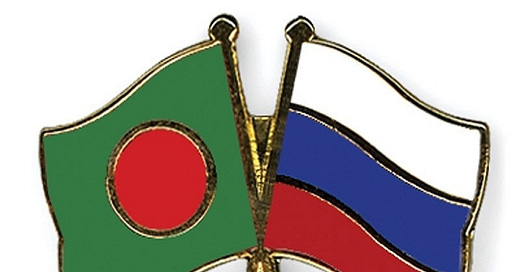Russian-Bangladeshi Relations Are About To Boom If The Reports Are True
The reported food and fuel deals will stand as testimonies to Bangladesh’s principled neutrality in the New Cold War between the US-led West’s Golden Billion and the BRICS-led Global South, while forthcoming cooperation between their national media champions will help raise broader awareness among its people of the multipolar zeitgeist that’s fundamentally transforming International Relations.
Russia and Bangladesh have enjoyed very close strategic relations for half a century, which have continued to persist despite enormous pressure upon that South Asian state by the US. Three recent developments make it worthwhile to briefly update observers about the bright future of their ties. The first and most significant is that Bangladesh will reportedly import 500,000 tonnes of wheat from Russia at $430 a ton according to the news that that began to circulate on Sunday, which cited unnamed government officials who supposedly have direct knowledge of the matter.
If proven to be true, then that would be significant since it represents 2.5 times more wheat than Dhaka was earlier in talks with Moscow over importing in late June. This development would also contrast with Pakistan’s US-backed post-modern coup regime recently snubbing a proposal from Russia to purchase 120,000 metric tons of wheat at $399.50 following Moscow’s rejection of Islamabad’s second counteroffer to drop the price by another 2.4% after it was earlier reduced by 2%. The takeaway is that Bangladesh is prioritizing food security while Pakistan is poised to gamble for lower prices elsewhere.
The second development of relevance to the Russian-Bangladeshi Strategic Partnership is the complementary reports that an oil deal might follow the supposedly forthcoming wheat one. Should that happen, then it would testify to the geo-economic basis of their 21st-century relations and Russia’s “Return to South Asia” more broadly. Furthermore, it would suggest that Bangladesh was positively influenced by India to proudly defend its objective national interests in the face of US pressure. In fact, it could even employ India’s recently established de-dollarization mechanism with Russia to seal this deal.
Finally, the last item of pertinence in their bilateral ties is Russian Ambassador Alexander Mantyskiy’s proactive engagement with Bangladeshi society during last week’s roundtable discussion that coincided with his country’s special military operation in Ukraine stretching into its sixth month. He pledged to further strengthen relations while Sputnik’s director of international cooperation expressed interest in working more closely with his Bangladeshi counterparts. A few days later, Ambassador Mantyskiy published an article about bilateral ties in the context of the global systemic transition to multipolarity.
Taken together, these three developments prove that Russian-Bangladeshi relations not only remain on track despite US efforts to sabotage them, but are actually about to diversify into exciting domains. The reported food and fuel deals will stand as testimonies to Bangladesh’s principled neutrality in the New Cold War between the US-led West’s Golden Billion and the BRICS-led Global South, while forthcoming cooperation between their national media champions will help raise broader awareness among its people of the multipolar zeitgeist that’s fundamentally transforming International Relations.
What’s so impressive about all of this is that Bangladesh has truly defied all the expectations that most of the world had of it at the dawn of that country’s independence half a century ago. Most wrote it off as an irredeemably failed and impoverished state, but its visionary leadership proved them wrong across the decades. Bangladesh has comprehensively outperformed Pakistan, of which it used to be part, by all metrics. It’s also far outpaced that country in recent months with respect to embracing multipolar trends after Islamabad shied away from doing so due to its American patron’s pressure.
Altogether, it can be said that Bangladesh is well on the way to becoming a role model for its Global South peers. Its leadership has skillfully managed to keep the country afloat despite immense structural difficulties caused by a combination of the latest phase of the Ukrainian Conflict and American meddling, unlike Pakistan which has regrettably experienced profound domestic problems brought about by the US-orchestrated post-modern coup and has consequently begun to isolate itself from the region. The future is indeed bright for Bangladesh, which wouldn’t be the case had it dumped Russia.




